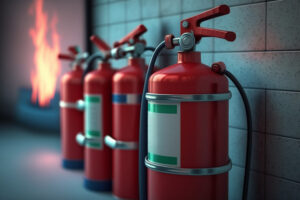Fire safety in rental properties affects both landlords and tenants. A frequently asked question in this context is, ‘Are landlords supposed to provide fire extinguishers?’
The response isn’t simple since it relies on regional regulations, property categories, and personal arrangements between property owners and renters. One thing is evident: fire safety is essential for safeguarding lives, assets, and tranquility.
Whether you’re a property owner aiming to meet your obligations or a renter safeguarding your rights, this detailed guide will address: are landlords supposed to provide fire extinguishers?
- Legal fire safety obligations for landlords.
- The importance of fire extinguishers.
- Practical tips for both landlords and tenants.
- How collaboration makes properties safer for everyone.
Legal Responsibilities of Landlords
General Overview of Fire Safety Laws
Across the globe, fire safety laws differ by state, country, and municipality. However, a shared principle applies universally: landlords have a legal obligation to provide a safe and livable environment. Fire safety requirements landlords often must follow include:
- Smoke Detectors: Proper installation and regular maintenance in sleeping areas, hallways, and kitchens.
- Emergency Exits: Ensuring all exit points are accessible and clearly marked.
- Electrical Safety: Ensuring all electrical systems comply with regulations.
Landlords should consult local fire codes or liaise with fire departments to ensure full compliance.
Fire Extinguisher Requirements
Landlords’ legal requirement to supply fire extinguishers is influenced by various elements:
- Single-Family Homes
Regulations are generally more relaxed for single-family rentals, lacking a universal mandate for extinguishers. Nonetheless, property owners who supply extinguishers actively safeguard their premises and residents.
- Multi-Unit Buildings
Multi-unit buildings frequently impose more rigorous standards. Fire extinguishers are often required in corridors, staircases, and entryways. Local codes outline standards for placement and upkeep.
- Commercial Properties
Commercial property regulations usually mandate that fire extinguishers be easily accessible, routinely checked, and positioned strategically.
Landlords must understand local regulations to stay compliant and prevent penalties.
Additional Fire Safety Obligations
Fire safety goes beyond just fire extinguishers. Additionally, other important duties consist of:
- Carbon Monoxide Detectors
Required for properties with gas appliances or fuel-burning systems.
- Fire Escapes and Access
Keeping pathways clear and emergency doors operational.
Thorough fire safety guarantees tenant protection in emergencies while landlords efficiently manage risks.

Why Fire Extinguishers Are Important
The Role of Fire Extinguishers in Fire Safety
Fire extinguishers are essential for controlling minor fires. The National Fire Protection Association (NFPA) emphasizes their capability to limit fire propagation, decrease property loss, and protect lives.
Regardless of a kitchen grease fire or an electrical spark, extinguishers offer residents the opportunity to respond promptly and safely.
Benefits for Landlords
- Safeguard Investments
A fire extinguisher can determine whether a small fix is needed or a major reconstruction is required.
- Minimize Liability
Offering accessible safety gear shows responsibility and shields landlords from potential legal actions.
Benefits for Tenants
- Enhanced Security
Renters feel more secure knowing they are prepared to manage small emergencies.
- Prompt Emergency Response
Access to tools allows tenants to act before professional assistance arrives, which could preserve lives and property.
Tips for Landlords
Providing Fire Extinguishers
To maximize safety, landlords should follow these best practices:
- Choose the Right Type
Choose ABC-rated fire extinguishers, as they are suitable for fires involving wood, grease, electrical devices, and others.
- Strategic Placement
Place extinguishers in high-risk areas like kitchens, near heating appliances, and in shared spaces of multi-unit buildings.
Maintenance and Inspections
Fire extinguishers need regular maintenance to guarantee they operate effectively when required:
- Monthly Checks
Inspect extinguishers for visible damage, leaks, or pressure issues.
- Annual Servicing
Arrange for expert assessments for certifications, restocking, and detailed reviews.
- Timely Replacements
Check expiration dates. Many extinguishers need replacement after 5 to 15 years.
Educating Tenants
Even the best equipment won’t help if tenants aren’t trained to use it:
- Short Tutorials
Offer demonstrations during move-ins or provide accessible instructions.
- Fire Safety Resources
Distribute straightforward, sequential instructions or direct links to trusted online materials.
Tips for Tenants
Understanding Your Rights
Tenants should be proactive in understanding fire safety provisions:
- Review Lease Agreements
Check for clauses detailing fire safety equipment.
- Research Local Laws
Determine if landlords have a legal requirement to supply extinguishers in the vicinity.
Fire Safety Practices
Tenants can bolster safety efforts by observing these routines:
- Keep Access Clear
Ensure all safety equipment, including extinguishers, is unobstructed and labeled.
- Report Problems
Notify landlords of any malfunctioning or missing fire equipment.
What to Do If Fire Extinguishers Aren’t Provided
If extinguishers aren’t supplied and aren’t legally required:
- Contact Your Landlord
Provide data or arguments explaining their importance.
- Buy Your Own
Personal fire extinguishers are quite inexpensive and offer reassurance.
- Reach Out to Authorities
Report non-compliance if extinguishers are legally mandated.
Collaboration Between Landlords and Tenants
Effective dialogue between landlords and tenants promotes a more secure living space:
- Joint Safety Checks
Schedule regular inspections and discuss fire safety improvements collaboratively.
- Fire Safety Drills
Acquainting everyone with protocols guarantees tranquility and cooperation in times of crisis.
Acting as a team minimizes risks and boosts trust.
Prioritize Fire Safety Together
Regarding rental properties, fire safety is not merely a legal requirement. It’s a collective duty that safeguards lives, properties, and assets. Are landlords supposed to provide fire extinguishers? Landlords can earn tenant trust and avoid expensive accidents by supplying fire extinguishers. Tenants, on the other hand, can promote their safety and enhance emergency readiness.
Regardless of whether you are a landlord or a tenant, prioritize the establishment of a safe and secure living space. By working together, you’ll not only be better prepared for unforeseen situations but also avoid the challenges that can arise from selling a fire-damaged house.
Stay proactive. Stay safe. Protect your space.
Previous